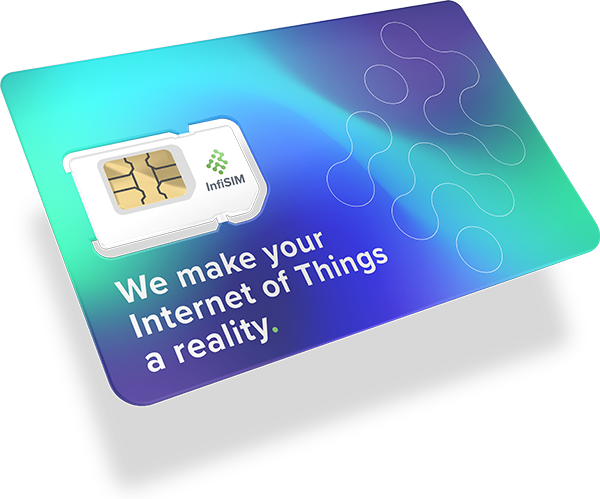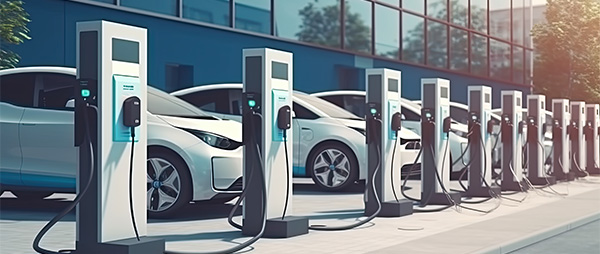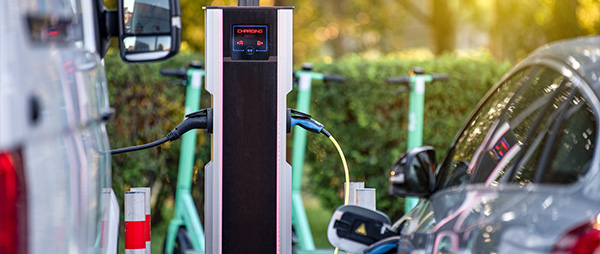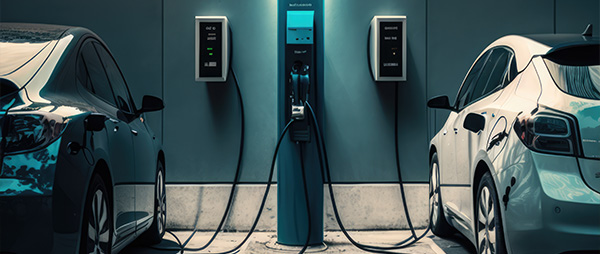IoT is contributing towards a more sustainable future.
IoT in EV charging
EVs are pioneering the future of sustainability
The transportation sector is undergoing a significant transformation, with electric vehicles (EVs) emerging as a key player in the quest for sustainable mobility. The shift from traditional fossil fuel powered vehicles to EVs is driven by a global push towards reducing carbon emissions and mitigating the effects of climate change. As the adoption of EVs accelerates, the demand for an efficient and reliable EV charging infrastructure has become more pronounced.
This rising demand for a better EV infrastructure isn’t just about installing more charging points. It involves a comprehensive approach to ensuring these points are effectively managed, accessible, and capable of meeting the evolving needs of EV users. Here, the Internet of Things (IoT) plays a critical role.
Introduction to IoT & EV charging
IoT refers to the interconnected network of devices that communicate and exchange data. In the context of EV infrastructure, IoT is the technological backbone that enables the development of smart, interconnected charging stations. These stations are capable of real-time communication and data exchange, vastly improving the EV charging experience for users and operators alike.
The integration of IoT in EV infrastructure represents a paradigm shift in how we approach electric mobility. It’s not just about electrifying vehicles; it’s about creating a smart, responsive network that supports the growth and sustainability of EVs. This article delves into the multifaceted role of IoT in revolutionising the EV charging infrastructure, highlighting its benefits, challenges, and future potential.
The role of IoT in EV charging infrastructure
The integration of IoT in EV infrastructure is pivotal for enhancing the efficiency and functionality of EV charging stations. IoT connectivity allows for a seamless orchestration of charging station operations, making them more than just power outlets. These stations become part of a larger, interconnected system capable of real-time communication and data exchange. The Internet of Things is instrumental in connecting EV charging stations, facilitating user authorisation, simplifying payment processes, and ensuring efficient station monitoring and maintenance.
Real-time data transfer & asset management
IoT’s capability to transfer data in real-time is fundamental for efficient asset management in EV charging. Operators can monitor performance of EV charging stations, track usage patterns, and swiftly respond to technical issues, greatly enhancing the overall customer experience. To effectively manage charging stations, it is vital for each of them to have a SIM card for seamless cellular network connectivity. This ensures real-time data transfer, allowing for remote management of these stations.
IoT’s impact on EV charging operations
IoT’s influence extends beyond connectivity; it revolutionises how EV charging providers deploy, operate, and maintain their infrastructure. IoT technology enables smart energy management, providing valuable data that improves planning and facilitates the development of new customer services. This technological integration ensures that EV charging stations are utilised efficiently and remain profitable and sustainable.
Consumer behaviour & market trends
Consumer behaviour is experiencing a marked shift towards the adoption of electric vehicles. This transition is fuelled by an increasing awareness of environmental concerns and the desire for more sustainable transportation options. The adoption trend is further supported by technological advancements and focused research in EV charging infrastructure, projected to enhance the overall industry dynamics.
Challenges in EV charging infrastructure
The development of a robust EV charging infrastructure presents several challenges, including infrastructure management, customer experience, profitability, maintenance, monitoring, and energy management. One of the primary challenges lies in connecting, maintaining, and managing the disparate elements of the EV ecosystem including charge points, payment systems, locators, maintenance, and more. The geographical dispersion of charging stations also adds a layer of complexity, as onsite management is challenging and expensive.
Managing charging stations & enhancing UX
The widespread geographic distribution of EV charging stations poses a significant challenge in terms of management and maintenance. IoT technology addresses this challenge by enabling Charge Point Operators (CPOs) to monitor and manage these stations remotely. This capability is crucial for providing real-time insights into usage, device performance, and fault monitoring. IoT facilitates proactive maintenance, reducing downtime, and enhancing operational efficiency.
Improving charger availability with IoT applications
A critical aspect of managing charging stations is ensuring their availability to users. IoT-driven applications allow users to locate nearby charging stations, check their availability, and even reserve charging slots. This not only improves user convenience but also helps with the optimisation of charger utilisation. Real-time data provided by IoT applications is instrumental in this process, helping users make informed decisions about their charging needs.
Smart charging & energy management
Energy management is another vital area where IoT plays a significant role. Smart charging, enabled by IoT, allows for optimising energy consumption based on varying energy rates and grid demands. As the prevalence of EVs grows, managing the load on the electrical grid is increasingly important. IoT helps track the charging patterns and station utilisation, enabling more efficient energy distribution and minimising peak load demand.
Enhancing the EV user experience
The integration of IoT in EV charging infrastructure goes beyond technical efficiencies; it significantly enhances user experience. Real-time availability information, easy reservation systems, and efficient charging processes contribute to a seamless and convenient experience for EV drivers. IoT plays a pivotal role in encouraging wider EV adoption by reducing waiting times and improving the reliability of charging stations.
Creating sustainable urban ecosystems & smart cities
The collaboration between smart cities and electric vehicles (EVs) fundamentally transforms urban mobility. Smart cities, leveraging technology and data, aim to enhance transportation efficiency and improve the quality of life for urban residents.
The future landscape of IoT-enabled EV charging stations
The evolution of IoT in EV charging infrastructure is just beginning. As the EV market grows, there is a significant potential for advancements and innovations in this space.
Why use InfiSIM for your IoT SIMs?
InfiSIM are one of the most reputable IoT SIM card providers with hundreds of thousands of SIMs deployed globally. We have UK-based support and fantastic reviews, so you can be sure that your business is in safe hands.








